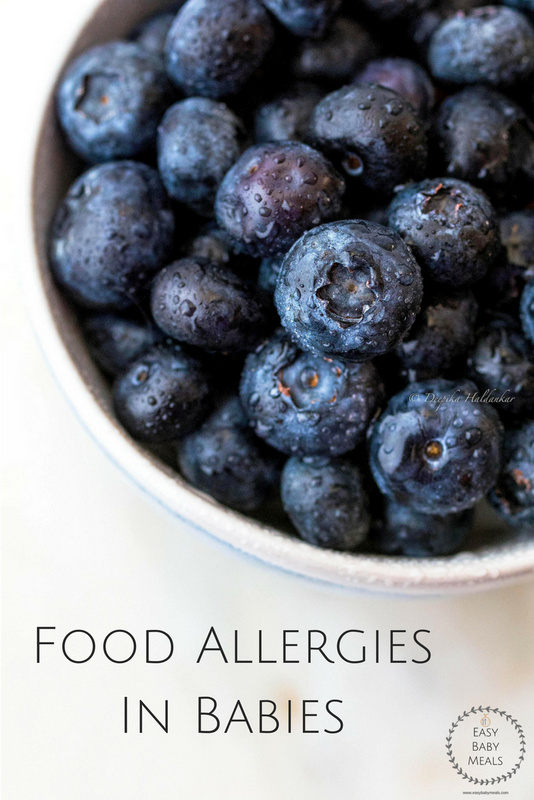A quick information on Food Allergies In Babies

Reaching 6 months is a major milestone for babies. This is the time when they are usually introduced to food, besides mother’s milk. It is one of the exciting times, but it also comes with questions and concerns.
Which foods are safe, and what can cause harm to a budding eater. What type of food can cause allergic reactions and how to avoid such reaction. I was troubled with all such questions for a very long time when I was about to start solids for my daughter. After doing some reading, I got answers to some of my questions.
What are food allergies:
According to ‘Great Expectations- Best Food for your Baby and Toddler’, Food allergies also called Food Hypersensitivities, usually occur when a body’s immune system reacts to normally harmless elements in food.
A primary job of an immune system is to locate and fight off anything that can harm the body. If a child develops the allergic reaction, it basically means that her body immune’s system wrongly believed that something your child ate is harmful to the body.
In an attempt to protect the body from impending danger, the immune system produces IgE antibodies to that food. They trigger mast cells (which are allergy cells in the body) to release chemicals into the bloodstream.
One of these chemicals is ‘histamine’. Histamine acts on the eyes, nose, throat, lungs, skin, or gastrointestinal tract and causes symptoms of the allergic reaction.
Once the body has made antibodies against a certain food, those antibodies register and recognize that food. So, when next time baby eats that particular food, the body releases histamine into the bloodstream again, creating allergy symptoms. In severe food allergies, reactions can occur even if the person touches or breathes in particles of the food.
Signs of Allergic Reactions:
The allergic reactions could be mild to severe. My daughter developed few red spots all throughout her body when I first introduced her to carrots at the end of 6 months. I knew it was the reaction to carrots and stopped it at once.
I started giving her carrots again at the beginning of 9 months with my fingers crossed, but she took it well without any reactions. So in my daughter’s case, it was just a mild reaction, which went away in a day. It was a rash. Here are few other allergic symptoms to look out for:
- Rashes/ skin changes, hives, itchy bumps, red sandpapery rash on face, facial puffiness, dark circles around eyes or red rash around the anus.
- Crankiness, irritability, unusual crying
- Bloated stomach, painful belly, gas or unusual vomiting.
- Watery stools, mucus in stools, diarrhea.
- Wheezing, respiratory problems, sneezing, itchy or watery eyes.
While the deadly allergic reaction can affect the baby’s ability to breathe. It is called Anaphylaxis, which is sometimes caused by peanuts, tree nuts and crustacean shellfish. The symptoms include hives, difficulty breathing, swelling of lips, tongue or mouth area, belly pain or unconsciousness.
Allergy triggering foods:
- Shellfish
- Egg
- Fish
- Peanuts
- Tree Nuts (walnuts, pecans, almonds)
- Soya bean
- Cow’s Milk
- Wheat
What Can We Do:
For babies and families with a history of allergies, it’s always better to delay the introduction of these foods and follow the pediatrician’s advice. Also, while introducing solids, it’s best to start with foods, those are best suited for the babies. While introducing the new food, follow the ”3-day” rule, i.e giving a particular food item continuously for 3 days and keeping a close look for any changes in the baby. Start with the small amount and then gradually increase the quantity. Do not introduce two or three new food items together. If a baby develops a reaction, it will be difficult to determine which food item caused it.
It’s always better to use caution, be vigilant about what the baby is eating and stay well informed about food allergies. So if something comes up, we are well prepared to handle it.
References:
Book:
Jeannette L.Bessinger, CHHC with Tracee Yablon-Brenner, RD, CHHC ‘Great Expectations- Best Food for Your Baby & Toddler’ (New York, Sterling 2010), pages referred: 95,96,97.
Important Note:
Talk to your baby’s Pediatrician before starting any new food.
© EasyBabyMeals. All the content is copyright protected. Do not use without prior permission.
The article is very informative and is well written. A lot of efforts and searching of right material must have gone in writing this article
Thank you for the kind words, I am glad you liked it..!!